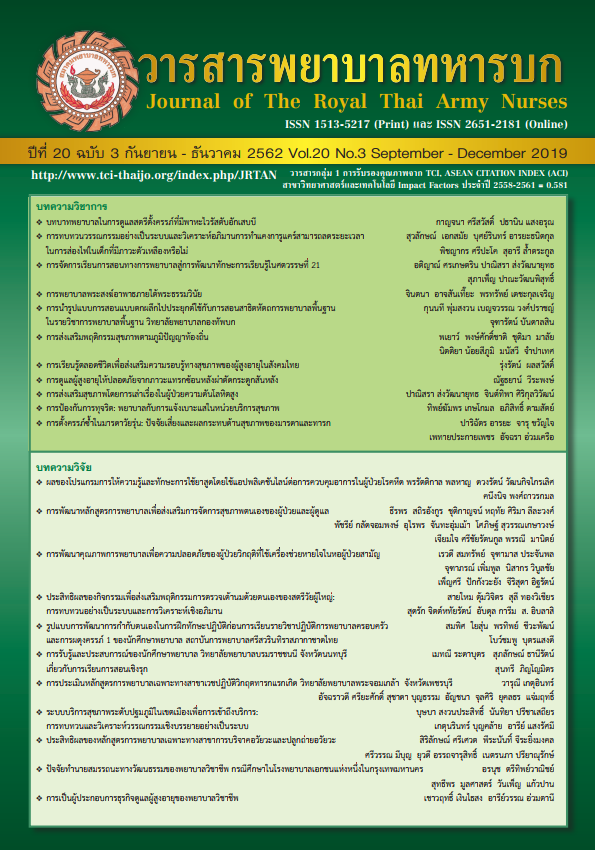The Effects of Education and Inhaler Skills Program through Line Application on Symptom Control among Asthmatic Patient
Keywords:
asthma control, inhaler techniques, education and inhaler skills program through line applicationAbstract
The present study was a randomized controlled trial whose objective was to study the effects of education and inhaler skills program through line application on symptom control among asthmatic patient. The sample comprised 64 asthmatic patients who sought treatment at the outpatient examination room in a tertiary hospital, Bangkok. Block random assignment was used to assign the sample into the experimental group (N=32) and the control group (N=32). The control group received the regular nursing care and the handbook for asthmatic patient. The experimental group received the education and inhaler skills program through line application developed based on IMB model. There was a 6-week trial period. Data were analyzed by Independent t-test.
The results showed that the experimental group and the control group were female, 81.3% and 68.8%, respectively. The experimental group had the average age of 59.47 years (SD = 9.87), and the control group, the average age of 58.13 years (SD = 12.65). It was found that before the experiment, the experiment group and the control group were not significantly different; in fact, the mean asthma control scores of the experimental group before and after the program were 3.56 (SD = .76) and .56 (SD = .62), respectively, and those of the control group were 3.13 (SD = .55) and 1.50 (SD = .76), respectively. After the experiment, the level of asthma control in asthmatic patients in the experimental group was higher than that in the control group at a statistical significant level of p < .001
Recommendations were that nurses use the education and inhaler skills program through line application to provide disease knowledge, develop inhaler skills with information, feedback and two-way communication to increase the effectiveness of symptom control in asthmatic patients
Downloads
References
2. Strategy and Planning Division Office of the Permanent Secretary for Public Health. Public Health Statistics A.D. 2015. Public Health Statistics Nonthaburi: Strategic and Planning Division Office of the Permanent Secretary for Public Health; 2015. (in Thai)
3. Strategy and Planning Division Ministry of Public Health. Statistical Thailand 2017. Strategy and Planning Division Ministry of Public Health: Thanon Tiwanon, Amphoe Muang, Nonthaburi; 2017. (in Thai)
4. Boonsawat W, Thompson PJ, Zaeoui U, Samosorn C, Acar G, Faruqi R, et al. Survey of asthma management in Thailand - the asthma insight and management study. Asian Pacific Journal of allergy and immunology. 2015;33(1):14-20.
5. Barbara S, Kritikos V, Bosnic-Anticevich S. Inhaler technique: does age matter? A systematic review. European respiratory review: an official journal of the European Respiratory Society. 2017;26(146).
6. Chogtu B, Holla S, Magazine R, Kamath A. Evaluation of relationship of inhaler technique with asthma control and quality of life. Indian journal of pharmacology. 2017;49(1):110-5.
7. Boulet LP, Vervloet D, Magar Y, Foster JM. Adherence: the goal to control asthma. Clinics in chest medicine. 2012;33(3):405-17.
8. Sanchis J, Gich I, Pedersen S, Team ADMI. Systematic review of errors in inhaler use: has patient technique improved over time?. Chest Journal. 2016;150(2):394-406.
9. Rodrigues CD, Pereira RP, Dalcin Pde T. Effects of an outpatient education program in patients with uncontrolled asthma. Journal Brasileiro de pneumologia: publicacao oficial da Sociedade Brasileira de Pneumologiae Tisilogia. 2013;39(3):272-9.
10. Boulet L-P. Asthma control, education, and the role of the respiratory therapist. Canadian Journal of Respiratory Therapy. 2011;47(4):15-21.
11. Press VG, Kelly CA, Kim JJ, White SR, Meltzer DO, Arora VM. Virtual Teach-To-Goal Adaptive Learning of Inhaler Technique for Inpatients with Asthma or COPD. The journal of allergy and clinical immunology In practice. 2017;5(4):1032-9.e1.
12. Fisher JD, Fisher WA. Changing AIDS-risk behavior. Psychological bulletin. 1992;111(3):455-74.
13. Basheti IA, Obeidat NM, Reddel HK. Effect of novel inhaler technique reminder labels on the retention of inhaler technique skills in asthma: a single-blind randomized controlled trial. NPJ primary care respiratory medicine. 2017;27(1):9.
14. Local Pharmaceutical Committee, NHS Liverpool Clinical Commissioning Group. Inhaler Technique Checklist 2016: Liverpool, Merseyside, England.; 2016
15. Klein M, Mogles N, Van Wissen A. Intelligent mobile support for therapy adherence and behavior change. Journal of biomedical informatics. 2014;51:137-51.
16. Jeon E, Park HA. Development of the IMB Model and an Evidence-Based Diabetes Self-management Mobile Application. Healthcare informatics research. 2018;24(2):125-38.
17. Nakhornriab S, Wattanakitkrileart D, Charoenkitkarn V, Chotikanuchit S, Vanijja V. The Effectiveness of Mobile Application on Medication Adherence in Patients with Stroke. Journal of Nursing Science. 2017;35(3):58-69. (in thai)
18. Seesanea S, Wattanakitkrileart D, Charoenkitkarn V, Dumavibhat C, Vanijja V. The effectiveness of mobile application on medication adherence in patients with acute coronary syndrome after hospitalization. Nursing Journal of The Ministry of Public Health. 2560;28(1):61-74. (in thai)
Downloads
Published
How to Cite
Issue
Section
License
บทความหรือข้อคิดเห็นใดใดที่ปรากฏในวารสารพยาบาลทหารบกเป็นวรรณกรรมของผู้เขียน ซึ่งบรรณาธิการหรือสมาคมพยาบาลทหารบก ไม่จำเป็นต้องเห็นด้วย
บทความที่ได้รับการตีพิมพ์เป็นลิขสิทธิ์ของวารสารพยาบาลทหารบก
The ideas and opinions expressed in the Journal of The Royal Thai Army Nurses are those of the authors and not necessarily those
of the editor or Royal Thai Army Nurses Association.






